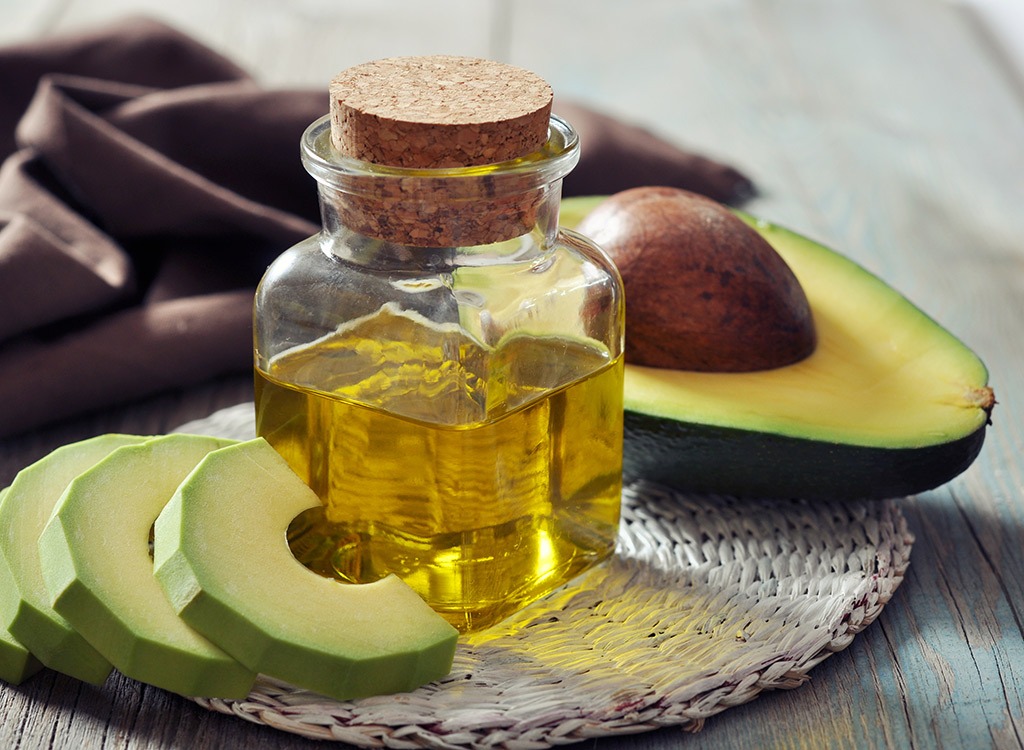Everything You Want to Know About Avocado Oil

Avocado fanatics have long embraced the fruit for its brightly colored flesh, creamy texture, mild flavor, and health benefits. Now, many are turning their attention to the fruit’s oil.
“I’m a huge fan of avocado oil and cook with it often, second only to olive oil,” says Malina Malkani, a registered dietitian nutritionist, spokesperson for the Academy of Nutrition and Dietetics and creator of the Wholitarian Lifestyle.
Malkani isn’t alone in her love for avocado oil. Sales of the healthy oil are on the rise, with the global market projected to reach $210 million in 2024, compared to $180 million in 2019, according to a recent Market Study Report.
We asked a few nutritionists to weigh-in on what all the fuss over avocado oil is all about.
What are avocado oil’s health benefits?
Avocado oil is high in heart-healthy, monounsaturated fat, which can help reduce LDL, or “bad” cholesterol, while maintaining HDL, or “good,” cholesterol levels, Malkani explains. Research shows that monounsaturated fats help reduce insulin levels and control blood sugar.
And because avocado oil is usually cold-pressed, it is less processed and retains many of its nutrients. That includes lutein, an antioxidant that supports eye health, she says.
Avocado oil also contains oleic acid, a fatty acid believed to offer cardiovascular benefits, says Rachel Fine, a registered dietitian nutritionist and owner of the New York City nutrition counseling firm To The Pointe Nutrition.
Fine says that most research has focused on the whole avocado fruit, rather than just the oil, so it’s hard to know exactly what avocado oil’s health benefits are. In their whole fruit form, avocados are packed with nutrients like magnesium, potassium, B vitamins, and fiber.
“These may not be present in the oil,” Fine says. “However, avocado oil is known to contain a substantial amount of vitamin E. Additionally, consuming avocado oil with a meal will enhance the absorption of other fat-soluble vitamins like vitamin D, vitamin E, vitamin A, and vitamin K.”
Celine Beitchman, director of nutrition at the Institute of Culinary Education, points to two studies specifically examining avocado oil’s potential health benefits.
A 2015 study published in the World Journal of Gastroenterology found that avocado oil, like olive oil, was associated with weight loss and improved liver function. And a 2018 study from the International Journal of Molecular Science suggested that avocado oil used topically could have anti-inflammatory and antioxidant effects on the skin, including wound healing and repairing skin barriers.
How do you cook with avocado oil?
Avocado oil has a high smoke point, making it a good choice for cooking at higher temperatures, Fine said.
Beitchman agrees that avocado oil holds up well to cooking. But because it can be pricey, using it for frying or sautéing may not be the most budget-conscious choice. Instead, she recommends embracing its buttery, nutty flavor by using it as a finishing oil.
You can also use avocado oil in salad dressings or marinades. Or, try adding a spoonful to a smoothie to add healthy fats.
“There’s nothing like a beautiful drizzle of some kind of oil to brighten up a dish and to catch the light so that it’s just more appetizing: a drizzle on soup, a little drizzle on a pasta salad, or just to finish something before you send it to your customer or to your friend or family,” Beitchman says.
Malkani also suggests using avocado oil for baking. “The creamy texture and mild flavor taste amazing in quick breads and cakes,” she says.
How should you shop for avocado oil?
With many avocado oil products on the market, Fine suggests looking for extra virgin avocado oil. The extra virgin option is processed using high-quality fruits via mechanical extraction, rather than chemicals. Plus, these products also tend to have more flavor and nutrients.
Beitchman urges shoppers to look for an expiration date that’s within a reasonable timeframe. And pay attention to the oils’ packaging, too. She says oils in dark-colored bottles are best.
“The biggest issues with oils is that they break down when they’re exposed to light or heat or oxygen, and that can be a time issue or a temperature issue,” she explains.
Should you add avocado oil to your diet?
Avocado oil can be a healthy addition to a balanced meal or overall diet, but because it’s still a type of fat, Malkani says moderation is key. Oils, even ones made from avocados, tend to be calorie-dense.
“A good goal is to aim for the Dietary Reference Intake for fat in adults, or 20 percent to 35 percent of total calories from fat,” Malkani advises.
But individual diets may need more or less fat, Beitchman adds. And sometimes, the whole fruit may be more beneficial. “I think you’re probably going to feel more meaningfully full eating avocado than having a spoonful of avocado oil,” Beitchman says.
Still, Beitchman is an advocate for trying new foods and products. She urges home cooks to give avocado oil a whirl, preserving the “wonder in everyday cooking.”
“I think that people can get into ruts if they use the same thing all the time,” Beitchman says. “I would encourage someone to just go out and buy a small bottle [of avocado oil], so that it becomes just something they play around with, and maybe every couple of months get a different kind of an oil to add to their repertoire and cook with it and taste it and see if you like it and just try out new things.”
Whether you use avocado oil or another type of cooking oil, there are benefits and drawbacks to each. But if you love the taste of avocado, this could be a delicious way to incorporate even more of the fruit into your diet.








